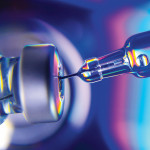HIV is able to infect cells in the female reproductive tract, brain, and colon that lack CD4 receptors, according to a report in the October 1st Journal of Acquired Immune Deficiency Syndromes.
“HIV can use a mechanism as gp120-independent infection to infect more types of cells than most scientists previously determined,” Dr. Shen Pang told Reuters Health. “Therefore, many pathogenic effects may not only be caused by the decrease of immune functions, but may also be caused by the infection of cells in some essential organs.”
Dr. Pang from UCLA Dental Institute and Jonsson Comprehensive Cancer Center, Los Angeles, California and colleagues used gp120-defective HIV to infect epithelial cells from the female reproductive system, colon, and glioneuronal cells to clarify the role of gp120 in HIV infection of CD4-negative cells.
HIV infected cell lines from the female reproductive tract, colon, intestine, and brain at rates ranging from 0.3% to 3.1%, the researchers report.
Infection occurred early, as addition of zidovudine during the first 2 hours of exposure inhibited HIV infection, but it only moderately inhibited infection when added 6 hours after exposure.
Culture medium from the infected cells was able to infect other cells, the results indicate, demonstrating that HIV can infect epithelial and brain cells and replicate and generate infectious viral progeny.
Results of further experiments suggest that virus could enter epithelial cells from the apical side and that replicated virus could bud out from the basolateral side of the cells.
Viral clones with truncated gp120 showed infection rates similar to those with intact gp120, the researchers write, “suggesting that the role of gp120 is minimal.” Moreover, CXCR4 and CCR5 were not required for HIV infection of these CD4-negative cells.
“HIV infects CD4-negative cells, and some of these cells are quite susceptible to such infection,” Dr. Pang said. “Many treatments that only focus on the infection of CD4-positive cells are not enough.”
“In the future, I want to identify the proteins responsible for HIV gp120-independent infection,” Dr. Pang added. “I believe that identification of these proteins is the key to prevent or eradicate HIV infection of CD4-negative cells.” 
Copyright © 2006 Reuters Limited. All rights reserved. Republication or redistribution of Reuters content, including by framing or similar means, is expressly prohibited without the prior written consent of Reuters. Reuters shall not be liable for any errors or delays in the content, or for any actions taken in reliance thereon. Reuters and the Reuters sphere logo are registered trademarks and trademarks of the Reuters group of companies around the world.
HIV Infects Epithelial And Brain Cells Lacking CD4






Comments
Comments